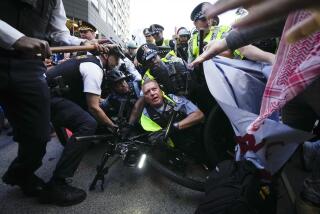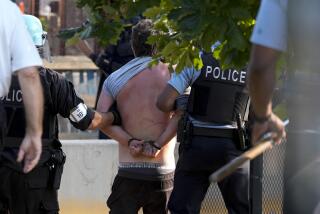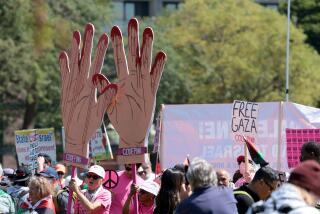Memories of a Brutal Convention : ‘If You Come to Chicago, Be Sure to Wear Some Armor in Your Hair’
- Share via
CHICAGO — Columnist Murray Kempton and activist Tom Hayden were arrested. Photographer Paul Sequiera got caught in the middle of the demonstrations and Abe Peck wanted to warn people to stay out of town.
Eugene McCarthy was in town because he was running for President.
They all remember August, 1968, in Chicago. So do the prosecutors and the police.
Abe Peck remembers.
“I was editor of the Chicago Seed, the old underground newspaper,” says Peck, now at Northwestern University’s Medill School of Journalism.
“Word was going around the country that the Yippie ‘Festival of Life,’ or counterconvention, was going to be ‘groovy,’ as they used to say back then, but those of us here were worried. I was trying to pass the message that ‘if you come to Chicago, be sure to wear some armor in your hair.”’
Deputy Chief of Patrol Carl Dobrich, a Chicago police officer who served in the convention’s disturbance task force:
“It was anarchy in the making. There were some good people, some sincere people, out there in the parks and streets but there were many others who were without any leadership and who were just looking for trouble. . . . “
On Wednesday, midway through the convention, “I heard officers being dispatched to the band shell area in Grant Park, where the flag was being taken down and replaced with some kind of Viet Cong banner. One thing kind of led to another. When the officers moved in, the demonstrators were gathering around (protest leader) David Dellinger, looking for instructions.
“After that skirmish, Dellinger pulled out of the band shell area, leading his flock, as it were.”
Some of the crowd headed for the Hilton.
“When we went for the first two to haul them away, they lashed out at the officers arresting them and kicked them. I got kicked myself.
“Then, everything started flying through the air as they started throwing things--rocks, shoes . . . everything.
“A tray full of dishes came flying out the window of one of the hotel rooms but I couldn’t see from which floor.
“Later, I recall seeing Dellinger standing along the curb right in front of the Blackstone Hotel. He was standing there like a whipped puppy. He was in this incredibly rumpled suit and was holding a long-stemmed flower--a daisy or something. The stem had been broken in the middle and he looked pathetic. An hour or so before, he’d been a leader . . . a guru or whatever . . . and he was going to lead everybody to a new world. Now he didn’t have anyone around him.”
Dobrich was later acquitted on perjury charges stemming from the disturbances.
Photographer Paul Sequiera, a free-lancer who used to work for the Chicago Daily News:
“I took a photo of Lt. Dobrich spraying Mace about a half-hour after the first police charge . . . that Wednesday night.
“It looks like a smile on his face but it’s really a grimace. It happened when a line of cops came forward with Dobrich commanding. A woman had come over . . . and was shaking her hand at the police, obviously incensed at what she’d seen. I wasn’t the target of the Mace but the picture looks that way.”
California Assemblyman Tom Hayden remembers seeing fellow protest leader Rennie Davis have “his head split open by the police while he thought he was trying to calm down or defuse a potential confrontation at an assembly at the band shell.
“Then he was taken away to the hospital and police came to the hospital trying to arrest him.
“Hospital workers had to hide him and get his head bandaged and get him into a cab so he could go to an apartment and rest.
“Late at night when the demonstrators got from the band shell to the front of the Hilton, it seemed to be the high point or the low point . . . of the weeklong confrontations when they sat down and the television lights came on and they chanted: ‘The whole world is watching.’
“I was right there. I was in the group of people that was being Maced and we backed up and a woman started screaming. . . .
“We fell back through the windows of the Haymarket Lounge, and everyone fell into the Hilton--and the police came after us through the broken windows. . . . It was hard to breathe with the gas and the Mace . . . but in any event there was a lot of panic and then the crowd fell backward . . . and everyone fell into the windows.
“I guess I wouldn’t want to go through those times again.”
Hayden, Davis, and six others were charged with conspiracy to incite violence.
Chicago Daily News reporter John Linstead, now an editor with the St. Louis Post Dispatch:
“I was one of 22 news people from around the country hit by police on Monday night in the first major violence of the week.
“It happened late in the evening during a police charge on demonstrators and I spent 36 hours at Henrotin Hospital for observation of cranial injuries.
“I had a helmet and gas mask in the park but, after the police cleared the park, I turned them over to the driver, who was going back to the paper. I was pressed up against a car in the intersection when I was clubbed.”
Three police officers accused of attacking Linstead were acquitted.
Newsday columnist Murray Kempton, now 70, was a convention delegate for McCarthy and was arrested for disorderly conduct during a march on the last day of the convention:
“Looking back, it was a little illogical, marching on an event I already had a pass to, but we felt at the time that if they had a few older guys there it would make things quieter.
“The cops were very nice once we got to the police station. We’d watched some of the earlier violence on monitors from the convention floor, and some of the younger people I encountered who had been arrested seemed almost relieved when they finally were in custody. . . . It was safer than the streets, I guess.
“Like a damned fool I took a trial instead of copping a plea on the disorderly conduct charge. I had to go back to Chicago. It took weeks and nearly bankrupted me. At one point, I had lunch with the mayor while they were crucifying me upstairs. They finally fined me $250.”
Attorney Camillo Volini, who prosecuted Kempton:
“When you ask me if I have any sharp memories of that time, I do--sharply painful.
“I guess I’ve matured a lot and I just don’t like to judge people anymore, but I felt even at the time that it was strange prosecuting some of the people that I did.
“I remember especially prosecuting a very classy group of people--13 of them as I recall--and wondering why they were in a courtroom.
“I was curious at the time as to why they would have behaved the way they did. It seemed immature to me then--I was 33--but the people themselves seemed so much more intelligent and mature than I was.”
Historian Staughton Lynd, who now works at a Youngstown, Ohio, legal clinic:
“I was with a group of pacifists. . . . We decided to march to the convention site in opposition to the Vietnam War and the police orders that demonstrators had to stay away from the Amphitheatre.
“We got there, about a thousand strong, and instead of just sitting down en masse, which we should have done, we decided to picket all night, so there were only two or three dozen by morning, when they arrested us easily. It was a very minor sideshow.
“My feelings haven’t changed that much in the intervening years. The major convention demonstrations set the tone--I think the wrong one--for the next few years of protest. They contributed to a lessening in the energy for local organizing.”
Eugene J. McCarthy, former U.S. senator from Minnesota whose campaign for the Democratic presidential nomination had spurred a number of the demonstrators to come to Chicago, although he urged them to stay away:
“I was fairly insulated from the actual violence but I saw a lot of the aftermath when they brought the wounded in from the fighting outside the hotel. They set up a temporary hospital in the Hilton. The Hilton charged us for the sheets that were used to make bandages.”
Later in the week, the McCarthy headquarters on the hotel’s 15th floor were raided by police and some of the campaign workers were beaten.
“Mainly, they routed people out of bed. I was in my suite on the 23rd floor when I heard what was happening. A girl was standing on a landing, very upset, and she said to me: ‘I don’t know why they did this. We were playing bridge and I had a 21-point hand!’ ”
Warned Not to Leave
McCarthy says he had intended to leave Chicago on Friday but the Secret Service warned him not to.
“They told me (Chicago Mayor Richard J.) Daley intended to arrest everyone with McCarthy credentials once I had left. I stayed on another day and we managed to sneak almost all of my people out of Chicago before I left.
“When my plane was taking off from Midway Airport on Saturday, our pilot got on the loudspeaker and said: ‘We’re now leaving Prague!’ ”
More to Read
Sign up for Essential California
The most important California stories and recommendations in your inbox every morning.
You may occasionally receive promotional content from the Los Angeles Times.













